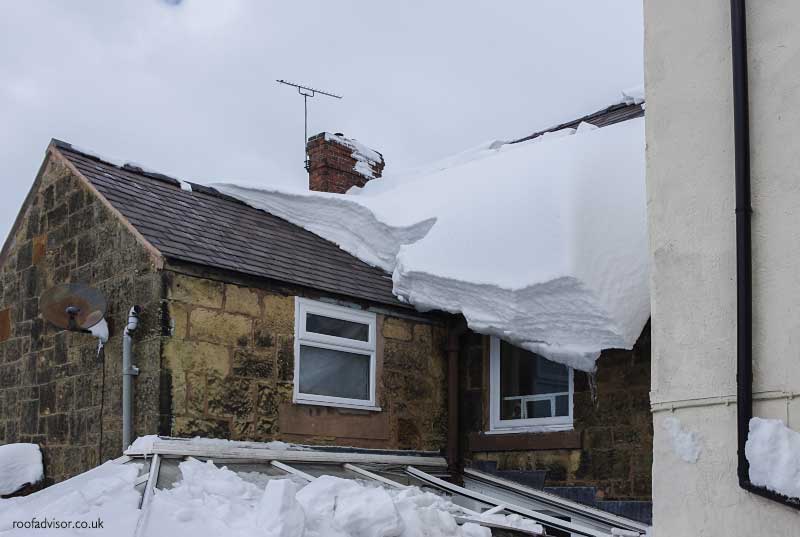Roof maintenance, what to look out for this winter.
As winter draws in so does the weather. Storms, heavy rain and snow can be problematic if your roof fails. But there are steps you can take in maintaining your roof to reduce these risks. Here we have outlined some roof maintenance tips and what to look out for before your roof fails.
How often should I check my roof?
While checking your roof might not be at the front of your mind, your roof is essential to keeping water out of your home. It may also save you hundreds in larger costly repairs when not caught soon enough. We recommend that you have a quick glance at the roof at least once a month. In this time you will generally be able to notice if anything has changed up there. The best form of inspection for a non-professional is comparison. If you’re still unsure of what to look for it may be best to seek the advice of a professional that can give you a qualified opinion.
What should I look for?
If you’re checking the roof regularly then you should be able to notice any changes when they happen. It’s also a good idea to check the roof over when you have experienced adverse weather conditions. Obvious problems on your roof could be visibly cracked/broken or dislodged slates and tiles, growth of moss generally on the north side where it stays damp and wet due to having less sunlight, during the summer months birds may nest in the roofline where they may be gaps. Birds nesting can be complicated as the law states that any active nests should not be disturbed until the young have flown. If you have birds nesting and would like to take action you must instruct a reputable contractor to take action outside of the nesting season. The nesting season generally runs from 1st March until 31st July. Where nests are closed it may be a requirement to set up a new nesting location.
Click here to book a FREE callback online!
Nearby Trees or overhanging objects
Stronger winds during the winter can cause branches from trees to snap with the possibility of it hitting your property. If a tree overhangs the roof of your property this risk is even greater. You may think the smallest of branches are insignificant but under a strong wind, these can still cause damage to the roof covering either dislodging or breaking. Trimming back these particular damages will reduce the risk. Its also during these months that trees will shed their leaves and possibly be deposited in your guttering. Trees don’t have to be overhanging the roof as the wind can carry them. If leaves are blocking your guttering you could potentially suffer a. blockage in the gutter causing a leak and possibly dampness. An annual gutter clean can prevent this issue.
Condensation caused by the colder weather
Weather conditions during the colder winter months are perfect for the formation of condensation. As the heating in our homes goes on and the external temperature decreases, the perfect conditions for surface condensation arise. This often occurs around the perimeter of external walls and windows as these are the coldest surfaces where the air settles. Just as water forms on your windows that you will most commonly notice, on older houses the insulation in your loft does not reach the edge of the room to allow airflow to the loft space and therefore creates a cold surface for thermal bridging. Warm moist air will settle there and form condensation and if not cleaned form visible dampness.
We have another blog post that covers condensation and airflow within the roof space which can be found here: https://purpleroofing.com/blog/condensation-airflow/
What should I do if something is wrong?
Calling a reputable roofing contractor is the appropriate step when you find a problem with your roof. Fixing any roof problem as soon as it is noticed will reduce the damage that may cause internally. It’s important to choose a contractor that is reputable, accredited and insured. Receiving a detailed quotation no matter how small the works are will help you make an informed decision on the course of action you need to take. While repairs and maintenance are smaller jobs health and safety should be considered when hiring a contractor. Ask with your quotation what steps they take to ensure the safe repair of the roof. If the cause of the accident is due to the homeowner’s negligence that you could have prevented due to knowing the danger existed, then you may also be liable.

Figure 1. Roof covered with snow during winter
How do I know if my gutter needs cleaning?
Unless the water is overflowing from the guttering, downpipes or leaking on a joint, nobody can be sure as to how blocked your guttering may be. If you have any of these issues then you should be looking to have the gutter cleared immediately as water blockages in a gutter can cause damp on the outer walls of your property. Where a property is located near trees or north-facing you should be looking to have your gutters cleared yearly after the autumn fall. In general, it is good practice to have the guttering checked yearly for blockages which may lead to costly repairs if problems are not found early.
In summary
using all of the above information you should be able to spot any issues with your roof and roofline early. However, it’s also a good idea to have it inspected by a professional.
- Visually check the roof monthly from the ground to spot any changes
- Note any birds nesting and have it inspected by a professional, remembering you cannot disturb a nest until the young have flow, this is law
- Have your guttering checked for blockages yearly
- Check for nearby trees that shed leaves or branches that could snap and cause damage to your roof covering
- Asses the ventilation in your rooms when the heating is on to allow the passage of warm moist air which may cause condensation
- If hiring a roofer to complete smaller works ensure they are still complying with health and safety
- When unsure, seek the help of a professional. Finding a problem early will protect the internals of your house saving you hundreds
You can book a callback for more information online HERE!


